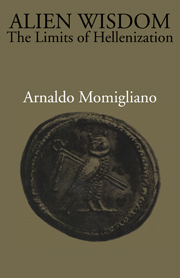Book contents
- Frontmatter
- Contents
- Per mia madre, presente sempre nel suo vigilc amore
- Preface
- 1 The Greeks and their neighbours in the Hellenistic world
- 2 Polybius and Posidonius
- 3 The Celts and the Greeks
- 4 The Hellenistic discovery of Judaism
- 5 Greeks, Jews and Romans from Antiochus III to Pompey
- 6 Iranians and Greeks
- Select Bibliography
- Index of Names
3 - The Celts and the Greeks
Published online by Cambridge University Press: 01 June 2011
- Frontmatter
- Contents
- Per mia madre, presente sempre nel suo vigilc amore
- Preface
- 1 The Greeks and their neighbours in the Hellenistic world
- 2 Polybius and Posidonius
- 3 The Celts and the Greeks
- 4 The Hellenistic discovery of Judaism
- 5 Greeks, Jews and Romans from Antiochus III to Pompey
- 6 Iranians and Greeks
- Select Bibliography
- Index of Names
Summary
You must not tell a citizen of Marseilles that Petronius, the author of the Satyricon, was not born near the Vieux-Port. Sidonius Apollinaris' lines
et te Massiliensium per hortos
sacri stipitis, Arbiter, colonum
(Carmen 23.155–6)‘You, Petronius, who in the gardens of Marseilles were the worshipper of the sacred tree-stock’ are given as evidence for the Massaliote origins of Petronius. They simply prove, as was seen long ago by Conrad Cichorius (Römische Studien), 438–42), that an episode in the lost parts of the Satyricon was located in Massalia.
But Marseilles could do with another writer. Between Salvian in the fifth century A.D. and our friend Henri-Irénée Marrou in the twentieth century very few names of French intellectuals can be connected with Marseilles. Even now the men who gesticulate along La Canebière look towards the sea rather than towards France. The strong tradition of autonomy which goes back to 600 b.c. survived the guns of Louis XIV and turned a marching song composed at Strasbourg into La Marseillaise.
My tale for today takes us back to the origins of the resistance of Marseilles to the seductions of the Celtic mainland.
The epic story of how the citizens of Phocaea abandoned their town rather than submit to the Persians is told by Herodotus 1.163 ff. No story conveys a better impression of the unity of the Mediterranean world in the sixth century b.c.
- Type
- Chapter
- Information
- Alien WisdomThe Limits of Hellenization, pp. 50 - 73Publisher: Cambridge University PressPrint publication year: 1975
- 1
- Cited by



